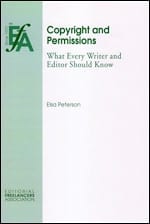Professor Charlotte Smith, an up-and-coming young entomologist, decided to write a textbook for the always-popular, upper-level course on spiders. After putting out a few feelers, she submitted a proposal to Six Legs Press, a leading publisher of books about insects. Six Legs loved the proposal and offered Professor Smith a contract. Charlotte was so abuzz with excitement—”tenure, here I come!” she yelled—that she signed the contract without even reading it.
Authors groups lose fight against Google Book Search
New York Federal Judge Denny Chin ruled November 14 that Google’s Book Search project meets the definition of fair use…
Does ‘first sale’ mean fewer sales?
Soon after the Supreme Court’s decision this past spring in Kirtsaeng v. John Wiley & Sons, a story in The…
Consequences of not following third party photo usage restrictions
Q: What happens if, notwithstanding your best intentions, a 3rd party photo usage restriction escapes your notice and your lapse is detected by the photographer or stock agency?
A: Steve Gillen, lawyer and partner in the intellectual property firm of Wood Herron & Evans:
“Well, about the best you could expect is that you will be deemed in breach of your contractual commitment and held to account for what you should have paid for the uses you actually made. More likely, however, is a claim that you have made an unauthorized and infringing use of a copyrighted work outside the scope of any license you might have had. In this event, the copyright owner has some very potent strategic advantages and remedies at his/her disposal:
What you need to know about using third party photos
Today’s business models for licensing third party photography are sufficiently complex that it’s worth taking a few minutes to review…
Insights on working with editors: An interview with Elsa Peterson
 Elsa Peterson has more than 20 years of experience in textbook and academic publishing as a freelance permissions editor, picture researcher, and developmental editor. Her most recent in-house position was as a senior developmental editor for psychology with McGraw-Hill Higher Education. Peterson recently authored a brief and accessible guide to copyright in the context of publishing titled Copyright and Permissions: What Every Writer and Editor Should Know (New York: Editorial Freelancers Association, 2012). She has also authored numerous articles about the business and craft of editing, and has presented TAA audio conferences on editing and copyright.
Elsa Peterson has more than 20 years of experience in textbook and academic publishing as a freelance permissions editor, picture researcher, and developmental editor. Her most recent in-house position was as a senior developmental editor for psychology with McGraw-Hill Higher Education. Peterson recently authored a brief and accessible guide to copyright in the context of publishing titled Copyright and Permissions: What Every Writer and Editor Should Know (New York: Editorial Freelancers Association, 2012). She has also authored numerous articles about the business and craft of editing, and has presented TAA audio conferences on editing and copyright.





